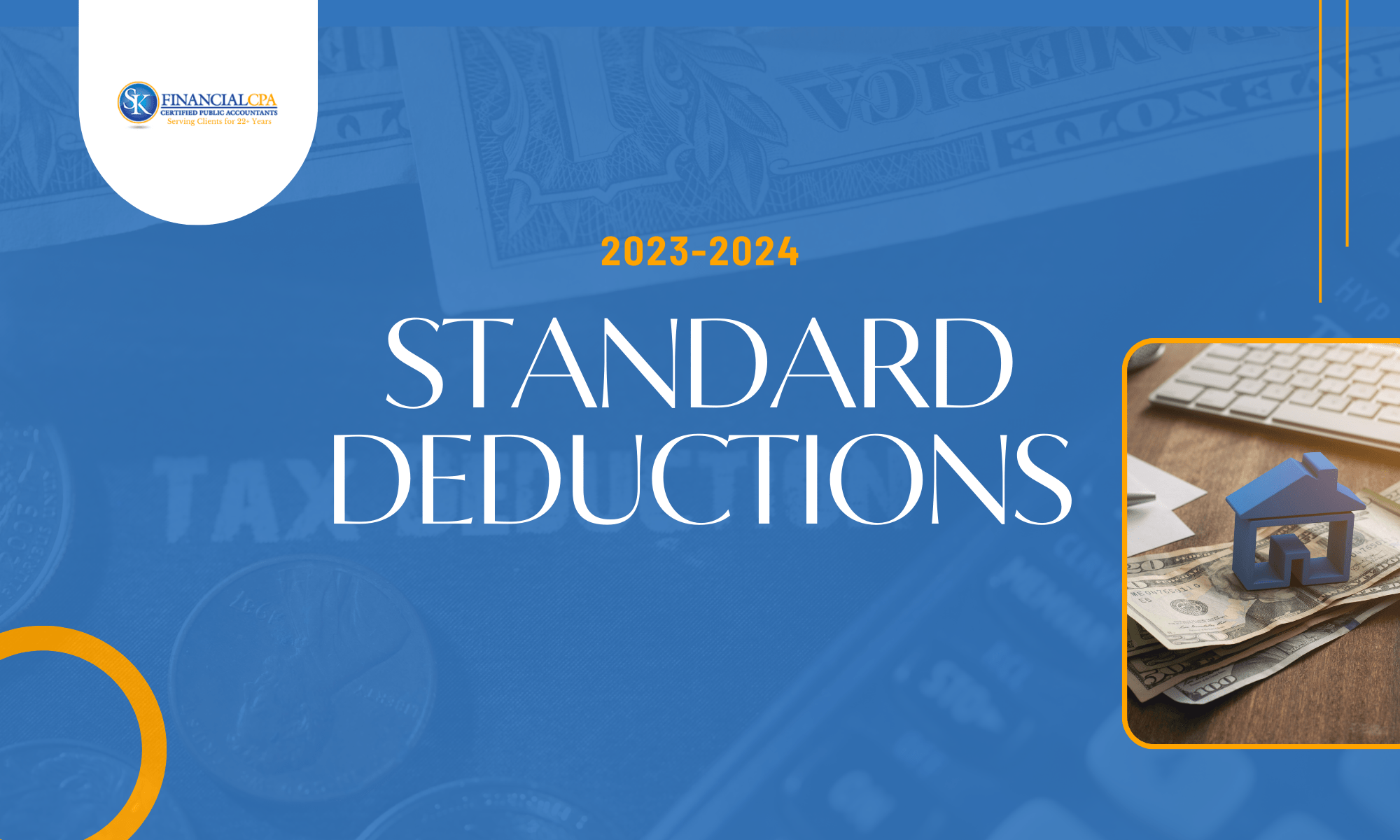
Standard Deduction 2023-2024 | Understand the Standard Deduction
As we approach the 2023 and 2024 tax years, taxpayers need to understand the changes to the standard deduction and how they may affect their tax situation. The standard deduction is a crucial element of the U.S. tax code. It allows taxpayers to deduct a significant portion of their income immediately, reducing the income subject to federal income tax. This simplifies the tax filing process for millions of Americans, offering a straightforward way to minimise tax liability without needing itemized deductions.
The purpose of this article is to explain what standard deduction is, how much it is, when to take it, and how to understand it 2023-2024
What is the standard deduction?
The standard deduction is a fixed amount that reduces the amount of income on which you are taxed. It's a benefit that reduces your taxable income, ultimately lowering your overall tax liability. Taxpayers can choose between taking the standard deduction or itemizing their deductions, whichever results in a lower tax bill. The standard deduction amount varies depending on factors such as filing status, age, and whether the taxpayer is blind.
Understanding the Standard Deduction
Before we delve into the numbers for 2023–2024, let's briefly review the standard deduction and why it matters. The standard deduction is a fixed dollar amount that taxpayers can subtract from their income before income tax is applied. It varies depending on your filing status, age, and whether you or your spouse are blind. The primary filing statuses are single, married filing jointly, married filing separately, and head of household.
The IRS adjusts the standard deduction annually for inflation. This adjustment helps maintain the deduction's value over time, ensuring taxpayers do not lose purchasing power as prices increase.
How the standard deduction work?
The standard deduction works by reducing your taxable income by a predetermined amount set by the government. When you file your taxes, you can choose to either take the standard deduction or itemize your deductions, whichever results in a lower tax bill.
Here's how it works:
Determine your filing status
The standard deduction amount varies depending on your filing status In United States standard deduction amount varies (single $13,850, married filing jointly $27,700, head of household $20,800).
Calculate your taxable income
Start with your total income for the year (e.g., wages, salary, interest income), then subtract any adjustments to income (e.g., retirement contributions, student loan interest). This gives you your adjusted gross income (AGI).
Choose your deduction method
Compare the standard deduction amount for your filing status to the total of your itemized deductions (e.g., mortgage interest, property taxes, charitable contributions). You can choose the method that results in the lowest taxable income and, consequently, the lowest tax bill.
Apply the standard deduction
If you choose the standard deduction, simply subtract the standard deduction amount from your AGI. This reduces your taxable income, resulting in a lower tax liability.
File your taxes
Report your taxable income, deductions, and credits on your tax return, and calculate your final tax liability based on the tax rates for your income level.
2023 Standard Deduction in the United states
The standard deduction for 2023 is $13,850 for single filers and those married filing separately, $27,700 for married couples filing jointly, and $20,800 for heads of household. Tax returns claiming these deductions must be filed by April 2024.
|
Filing status |
2023 standard deduction |
|---|---|
|
Single |
$13,850. |
|
Married, filing separately |
$13,850. |
|
Married, filing jointly; qualified widow/er |
$27,700. |
|
Head of household |
$20,800. |
2024 Standard Deduction in the United states
The standard deduction for the 2024 tax year is expected to increase across all filing statuses due to inflation adjustments. Although the precise figures will be confirmed by the IRS later in the year, we can project reasonable estimates based on recent inflation trends.
Standard Deduction Amounts
|
Filing Status |
2023 Standard Deduction |
2024 Standard Deduction |
Change ($) |
|
Single |
$13,850 |
$14,600 |
+$750 |
|
Married Filing Jointly |
$27,700 |
$29,200 |
+$1,500 |
|
Married Filing Separately |
$13,850 |
$14,600 |
+$750 |
|
Head of Household |
$20,800 |
$21,900 |
+$1,100 |
The projected increase in the standard deduction in 2024 reflects the ongoing adjustments for inflation and the IRS's commitment to maintaining the deduction's value for taxpayers. This change means taxpayers can expect a modest reduction in their taxable income, potentially lowering their overall tax bill.
Comparison with the Previous Year
When comparing the 2024 standard deduction to 2023, it's clear that taxpayers across all filing statuses will benefit from an increase. This increment is particularly beneficial in light of economic conditions, including wage growth and inflation. By increasing the standard deduction, the IRS helps ensure taxpayers' take-home pay goes further, providing relief and supporting financial stability.
Percentage Increase from 2023 to 2024
|
Filing Status |
Percentage Increase |
|
Single |
5.4% |
|
Married Filing Jointly |
5.4% |
|
Married Filing Separately |
5.4% |
|
Head of Household |
5.3% |
The percentage increase highlights the IRS's uniform approach to adjusting inflation deductions, ensuring that no filing status benefits disproportionately.
Implications for Taxpayers
The increase in the standard deduction for 2024 has several implications for taxpayers:
-
Simplified Tax Filing:
Many taxpayers may find it more beneficial to take the standard deduction rather than itemizing deductions, simplifying the filing process. -
Lower Tax Bills:
With a higher standard deduction, many taxpayers will see a reduced taxable income and, consequently, their tax liability. -
Planning Opportunities:
Taxpayers should consider how the increased standard deduction affects their tax planning, including retirement contributions, charitable giving, and other tax strategies.
Regional Considerations
While federal tax laws, including those governing the standard deduction, apply uniformly across the United States, state-level tax considerations can significantly impact taxpayers' overall financial picture. Florida is unique in that it does not impose a state income tax, which means the federal standard deduction is even more critical for Floridians since it directly impacts their federal tax liability without any state-level adjustments.
The Benefit of No State Income Tax
The lack of a state income tax amplifies the importance of federal tax deductions, including the standard deduction for Florida residents. This can result in a more straightforward tax filing experience and potentially more significant savings, as Floridians are only subject to federal income tax liabilities.
Comparison of Tax Burden by State
|
State |
State Income Tax Rate |
Effective Savings with Standard Deduction |
|
Florida |
None |
High |
|
New York |
Up to 8.82% |
Moderate |
|
California |
Up to 13.3% |
Moderate |
(Note: The table above illustrates how state income tax rates can affect the overall savings from the standard deduction, with Florida residents enjoying higher adequate savings due to the absence of a state income tax.)
Additional Tables for Deeper Insights
To further understand the impact of the standard deduction and other tax-related changes, let's examine additional aspects that may affect taxpayers.
Impact of Standard Deduction on Effective Tax Rates
|
Filing Status |
2023 Effective Tax Rate |
2024 Projected Effective Tax Rate |
Change (%) |
|
Single |
10% |
9.5% |
-0.5% |
|
Married Filing Jointly |
10% |
9.5% |
-0.5% |
|
Head of Household |
10% |
9.5% |
-0.5% |
(Note: The effective tax rate is a hypothetical average considering the impact of the standard deduction. (Actual rates will vary based on total income and other deductions.)
Historical Standard Deduction Trends
|
Year |
Single ($) |
Married Filing Jointly ($) |
Head of Household ($) |
|
2020 |
12,400 |
24,800 |
18,650 |
|
2021 |
12,550 |
25,100 |
18,800 |
|
2022 |
12,950 |
25,900 |
19,400 |
|
2023 |
13,850 |
27,700 |
20,800 |
|
2024 |
14,600 |
29,200 |
21,900 |
This table illustrates the steady increase in the standard deduction over the past five years, highlighting the IRS's efforts to adjust for inflation and maintain the deduction's value.
Planning Standard Deduction
While the standard deduction is a significant factor in tax planning, taxpayers should also consider other aspects of their financial situation, such as retirement contributions, healthcare expenses, and educational costs, which can all influence their overall tax strategy.
For Floridians, the absence of a state income tax means that their financial planning will focus more on maximizing federal deductions and credits. Strategies include increasing contributions to tax-advantaged retirement accounts, leveraging health savings accounts (HSAs), or planning charitable contributions to optimize tax outcomes.
Advanced Tax Planning Strategies
While the standard deduction benefits many, advanced tax planning strategies can further optimize tax savings and financial health. These strategies often involve a more detailed understanding of the tax code. They can include timing income and deductions, leveraging tax-advantaged investments, and understanding the implications of new tax laws.
Tax Savings Strategies Beyond the Standard Deduction
|
Strategy |
Description |
Potential Benefit |
|
Itemizing Deductions |
For those with significant deductible expenses, itemizing can exceed the standard deduction. |
Maximizes deductions, potentially reducing taxable income further than the standard deduction. |
|
Charitable Contributions |
Making charitable donations can provide tax benefits, especially if you itemize deductions. |
Reduces taxable income and supports philanthropic efforts. |
|
Health Savings Accounts (HSAs) |
Contributions to HSAs are tax-deductible, and withdrawals for qualified medical expenses are tax-free. |
Lowers taxable income and provides funds for healthcare expenses. |
|
Retirement Account Contributions |
Contributions to certain retirement accounts can be deducted from taxable income. |
Reduces current taxable income while saving for retirement. |
Implementing these strategies requires careful planning and consideration of individual financial situations. For example, the decision to itemize deductions instead of taking the standard deduction depends on whether total itemizable deductions exceed the standard deduction for one's filing status.
Long-Term Financial Planning and Tax Considerations
Tax planning should not be a once-a-year activity but part of a comprehensive, long-term financial strategy. This approach includes considering future tax liabilities, retirement planning, estate planning, and investment strategies. For instance, understanding the tax implications of different retirement savings accounts (e.g., Roth IRA vs. traditional IRA) can significantly affect one's tax burden in retirement.
The Role of Tax Legislation
Tax legislation can significantly impact tax planning strategies. Recent tax reforms and stimulus measures have introduced changes to tax rates, deductions, credits, and other tax provisions. Staying informed about these changes is crucial for effective tax planning. For example, temporary provisions due to specific legislation might offer additional savings opportunities or require adjustments to existing strategies.
Impact of Recent Tax Legislation
|
Legislation |
Key Provisions |
Implications for Taxpayers |
|
Tax Cuts and Jobs Act (TCJA) |
Lowered individual and corporate tax rates and increased the standard deduction. |
Broadly reduced tax liability, making the standard deduction more attractive for many. |
|
Coronavirus Aid, Relief, and Economic Security (CARES) Act |
Including direct payments, expanded unemployment benefits, and other tax provisions. |
Provided additional financial relief and tax planning considerations during the pandemic. |
Complexities of Tax Planning
The standard deduction is a foundational element of the U.S. tax system, providing a straightforward means of reducing taxable income. However, effective tax planning encompasses a much broader spectrum of considerations, from advanced deduction strategies to understanding the implications of tax legislation. For individuals, particularly those in unique tax situations like Florida residents who benefit from no state income tax, exploring these additional layers of tax planning can yield significant financial benefits.
As we move forward into 2024 and beyond, taxpayers should remain proactive in their tax planning efforts, seeking opportunities to optimize their tax situation while staying compliant with evolving tax laws. Engaging with tax professionals and financial advisors can provide valuable insights and guidance tailored to individual financial goals and circumstances.
Ultimately, tax planning aims to minimize tax liability and maximize financial health, supporting long-term economic stability and success. By taking a comprehensive and informed approach to tax planning, individuals can navigate the complexities of the tax system and achieve their financial objectives.
FAQs
1. What is the standard deduction?
The standard deduction is a specific amount that reduces the income on which you are taxed. It varies by filing status and is adjusted annually for inflation. The standard deduction simplifies the tax filing process for many taxpayers by eliminating the need to itemize deductions.
2. How has the standard deduction changed for 2024?
For 2024, the standard deduction is expected to increase for all filing statuses due to adjustments for inflation. This increase allows taxpayers to deduct a more significant portion of their income, potentially reducing their tax liability.
3. Who benefits from taking the standard deduction?
Most taxpayers benefit from taking the standard deduction, especially those who do not have significant itemizable deductions (such as mortgage interest, charitable contributions, or medical expenses exceeding certain thresholds). It simplifies the filing process and often provides a more significant deduction than itemizing.
4. Can I take the standard deduction if I file as married separately?
Individuals filing as married separately can take the standard deduction. However, if one spouse itemizes deductions, the other spouse must also itemize, even if their deductions are less than the standard deduction.
5. What are the projected standard deduction amounts for 2024?
While the IRS will confirm the exact amounts, projections based on inflation trends suggest increases across all filing statuses. For example, single filers and married couples filing jointly could increase their standard deductions by several hundred dollars.
6. How does the standard deduction affect my tax filing?
The standard deduction directly reduces your taxable income, which can lower your tax bill. By choosing the standard deduction, you also avoid the need to itemize individual deductions, which can simplify your tax filing process.
7. Are there additional standard deductions for taxpayers over 65 or blind?
Yes, taxpayers over 65 or blind are eligible for an additional standard deduction on top of the base standard deduction for their filing status. This extra amount increases their total standard deduction, further reducing taxable income.
8. Can I switch between itemizing deductions and taking the standard deduction each year?
Yes, taxpayers can choose between itemizing deductions and taking the standard deduction each year, depending on which option offers the more significant tax benefit. Calculating both methods is advisable to determine which results in a lower tax liability.
9. How does the absence of a state income tax, like in Florida, affect the standard deduction?
For residents of states without a state income tax, the federal standard deduction becomes even more critical, as it's the primary means of reducing taxable income. These taxpayers may benefit more significantly from increases in the standard deduction as they don't have state tax considerations to navigate.
10. Where can I find more information about the standard deduction and other tax-related questions?
For the most accurate and up-to-date information regarding the standard deduction and other tax matters, visit the official IRS website or consult a tax professional. They can provide guidance tailored to your tax situation and help you navigate the complexities of tax law.
Follow SKFinancial on Facebook / Twitter / Linkedin / Youtube for updates.








